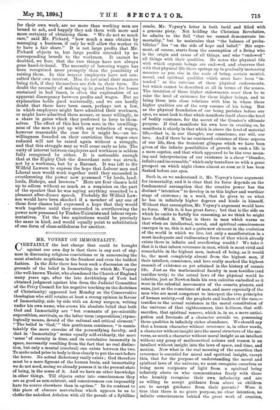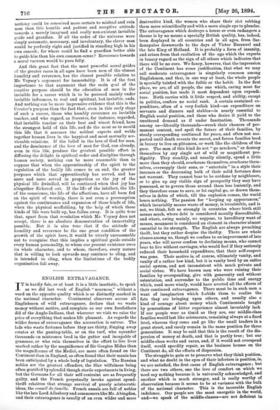MR. VOYSEY ON IMMORTALITY.
CERTAINLY the last charge that could be brought against our own day is that there is any sort of shy- ness in discussing religious convictions or in announcing the most absolute scepticism in the frankest and even the baldest fashion. In the Echo there has been such a discussion on the grounds of the belief in Immortality, in which Mr. Iroysey (the well-known Theist, who abandoned the Church of England many years ago, after the late Archbishop of York had obtained judgment against him from the Judicial Committee of the Privy Council for his negative teaching on the doctrines of Christianity) appeared last Monday as the Conservative theologian who still retains at least a strong opinion in favour of Immortality, side by side with an Army surgeon, writing under his own name, who avows his absolute belief that both God and Immortality are "but remnants of pre-scientific superstition, survivals, as the latter term Lsuperstition] etymo- logically means, devoid of the rational and critical element." "The belief in 'God,'" this gentleman continues, "is unmis- takably the mere exercise of the personifying faculty, and that in 'Immortality' seems equally self-evidently, the mere 'sense' of eternity in time, and its correlative immensity in space, necessarily resulting from the fact that no real distinc- tion, but only a mental (cerebral) one exists between the two. To make mind prior to body is thus clearly to put the cart before the horse. No actual dichotomy really exists ; God therefore must be a mere figment of the human brain, and immortality we do not need, seeing we already possess it in the present state of being, in the sense of it. And we have no other knowledge in other things. Till objects enter into consciousness they are as good as non-existent, and consciousness can impossibly have its source elsewhere than in egoism." In its contrast to this piece of obscure materialism which appears to us to clothe the nakedest Atheism with all the parade of a Sybilline
oracle, Mr. Voysey's letter is both lucid and filled with a genuine piety. Not holding the Christian Revelation, he admits to the full "that we cannot demonstrate ha- mortality," but he maintains that "the balance of proba- bilities" lies "on the side of hope and belief." His argu- ment, of course, starts from the assumption of a Being who is the origin and cause of all things, and who "endowed" all things with their qualities. He notes the physical life with which organic beings are endowed, and observes that with that physical life there springs up in gradually increasing measure as you rise in the scale of being, certain mental, moral, and spiritual qualities which must have been " in- tended " as the outcome of these physical endowments, but which cannot be described at all in terms of the senses. The intention of these higher endowments must then be to raise the level of existence for these higher beings, and to bring them into close relations with him in whom these higher qualities are of the very essence of his being. But as the physical foundation of our being perishes before our eyes, we must look to that which manifests itself above the level of bodily existence, for the secret of the Creator's ultimate purpose. If God manifests his own love in creating us, he manifests it chiefly in that which is above the level of material life,—that is, in our thought, our conscience, our will, our love. And if there be no continued existence of these aspects of our life, then the transient glimpse which we have been given of the infinite possibilities of growth in such a life is a mere caprice, and that which appeared to be the true mean- ing and interpretation of our existence is a sheer "blunder, infinite and inexcusable," which only tantalises us with a great prospect on which night closes almost as soon as it has been flashed before our eyes.
Such is, as we understand it, Mr. Voysey's terse argument for immortality, and it is clear that its force depends on the fundamental assumption that the creative power has the distinct " intention " to develop in us this higher and worthier stage of existence; in a word, that he gives to us what he has in infinitely higher degrees and kinds in himself. Without that assumption, Mr. Voysey's argument would have no force. With it, it has great force; but that is the aide on which he omits to fortify his reasoning, as we think he might have fortified it. What is there in man which warns us that when an intellectual, moral, and spiritual consciousness emerges in us, this is not a quite new element in the evolution of the world in which we live, but only a manifestation in a most inadequate and rudimentary form of that which already exists there in infinite and overflowing wealth ? We take it that it is that inborn reverence in man, which is most vivid and remarkable in the highest men, instead of being, as it would be, the most completely absent from the highest men, if their intellect, conscience, and. love really marked the highest summit of existence as yet attained in the history of cosmio life. Just as the mathematical faculty in man testifies (and testifies truly) to the actual laws of the physical world he inhabits, just as Newton finds his own calculus embodied as it were in the celestial movements of the comets, planets, and suns, just so the conscience of man, and more especially of the men who are most competent to interpret the true principles of human society,—of the prophets and leaders of the race,— testifies to the actual existence in the moral constitution of the universe of that righteousness, that holiness, that self- sacrifice, that spiritual reserve, which is, in us, a mere antici- pation and foretaste of a character outside us, possessing these qualities in infinitely richer abundance. We should say that a human character without reverence is, in other words, a character without insight into the moral structure of the uni- verse, as much a character without moral insight as an intellect without any grasp of mathemetical axioms and reason is an intellect without insight into the laws of space, and time, and motion. Now what is the real meaning of the assertion that reverence is essential for moral and spiritual insight, except this, that for the purpose of understanding the moral and spiritual laws of the universe, we must recognise ourselves as being mere recipients of light from a spiritual being infinitely above us who communicates freely with those who humbly recognise their own inferiority and are as willing to accept guidance from above as children are to accept guidance from their parents ? Were it true that there is no grave purpose, no clear intention, no infinite consciousness behind the great work of creation, nothing could be conceived more certain to mislead and ruin men than this humble and patient and receptive attitude towards a merely imagined and really non-existent invisible guide and guardian. If all the order of the universe were simply automatic, necessary, and involuntary, the clever man would be perfectly right and justified in standing high in his own conceit; for where could he find a guardian better able to guide him than his own common-sense? Reverence towards a moral vacuum would be pure folly.
And this great fact that the most powerful moral guides of the greater races in all ages have been men of the utmost humility and reverence, has the closest possible relation to Mr. Voysey's argument for immortality. It is of the first importance to that argument that the main goal of the creative purpose should be the education of men in the invisible for a career which is to be pursued mainly under invisible influences, to real and spiritual, but invisible, ends. And nothing can be more impressive evidence that this is the Creator's purpose than the fact that, even in this early stage of such a career, those who humbly reverence an invisible teacher, and who regard, as Socrates, for instance, regarded, that invisible teacher as their best and wisest friend, have the strongest hold of this life, and do the most so to mould this life that it assumes the noblest aspects and welds together human lives in the happiest and most mutually ser- viceable relations. If the belief in the love of God for man, and the dominance of the love of man for God, can already, even in this life, produce the greatest possible effect in diffusing the delight in spiritual order and discipline through human society, nothing can be more reasonable than to suppose that when the apprenticeship of the spirit to the regulation of the bodily life comes to an end, the greater purposes which that apprenticeship has served, and has more and more served in proportion as the joy of the physical life dwindled, will be continued when that joy has altogether flickered out. If the life of the intellect, the life of the conscience, the life of the affections, have all been fed on the spirit of worship, there is not even a presumption against the continuance and expansion of these kinds of life, when the physical scaffolding, by the help of which these kinds of life were built up, has fallen away. It is quite true that, apart from that revelation which Mr. Voysey does not accept, there is no absolute demonstration of immortality possible. But it is also true that if the attitude of humility and reverence be the one great condition of the growth of the spirit here, it would be utterly unreasonable not to recognise that this implies a spiritual guide outside every human personality, to whom our present existence owes its whole character, and to whom, therefore, every nature that is willing to look upwards may continue to cling, and is intended to cling, when the limitations of the bodily organisation fall away.



































 Previous page
Previous page